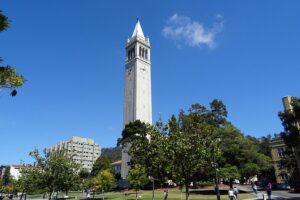The Media Studies program at UC Berkeley encourages student participation in study abroad learning opportunities since understanding media and globalization is central to our core curriculum. Studying abroad is a particularly enriching opportunity for Media Studies majors; it provides an opportunity for immersion in and engagement with media environments in specific historical, cultural, and linguistic contexts.
Before reviewing the information below, check out these videos from Media Studies alumni and faculty for their study abroad stories and perspectives on how Media Studies majors can benefit from studying abroad. Please see below for written video transcripts.
Where to Start
If you are interested in studying in another country, please first visit the Berkeley Study Abroad website for information about programs available, deadlines for applying, as well as information about Financial Aid.
Media Studies Study Abroad Coursework Evaluation
Any study abroad course a student wants to use towards their Media Studies requirements needs to be approved by a faulty adviser. There are two ways to do this:
1. After identifying a study abroad program, students can check the UC Berkeley Media Studies UCEAP Courses database (In progress – check back soon!) to see any courses that have been approved for the major. Please see the “UCEAP Course Database” tab below for more information. Any course listed as “approved” is automatically approved for the major. This does not apply to “previously approved” courses; any course listed as “previously approved” must be submitted for review via the process outlined in the next section.
2. For courses not marked as “approved” in the database, students should submit a petition for study abroad courses via the course substitution form. Note that while the form does not require submission of a syllabus or coursework, students should retain these course records in case the faculty reviewer needs additional documentation. Also, note that faculty approvals are conditional upon the course transferring to UC Berkeley as upper-division. See Policies below.
- Intended Majors Course Substitution Form (major not declared yet)
- Declared Majors Course Substitution Form – Last Name A-G
- Declared Majors Course Substitution Form – Last Name H-O
- Declared Majors Course Substitution Form – Last Name P-Z
UCEAP Course Database (Coming Soon)
Here you will find the UCB Media Studies UCEAP Courses database (coming soon!)
You may review this database of courses that have been approved or previously approved for the Media Studies major.
- Courses marked as “Approved” are approved for current Media Studies majors to apply to the Media Studies major. These courses do not need to be petitioned and will automatically count towards the Media Studies major requirements. Students can refer to the “Major Requirement” column to see which requirements these approved courses fulfill.
- Courses marked as “Previously Approved” are courses that students have had approved in the past but are not approved for current Media Studies majors to apply to the Media Studies major. Students who wish to take courses from this category (or other courses not listed on this database) and apply them to their Media Studies major requirements will need to submit the course for review via the course evaluation process outlined above.
Policies
- Students cannot fulfill Media Studies 10 or any of the core courses abroad.
- All courses taken abroad that are applied to Media Studies requirements must be taken for a letter grade.
- Upper-division Media Studies elective requirements can only be met through upper-division coursework.
- Classes that are taken abroad that articulate to a specific department count as coursework taken in that department. Since the Media Studies major permits no more than two upper-division courses from any single outside department or program for the major, students should be mindful of this when selecting courses. For example, if a student has taken two upper division Sociology courses at UC Berkeley, that student cannot take a third upper division Sociology course for the major while studying abroad.
General Tips
- When program planning for study abroad, it can be beneficial to plan on trying to meet upper-division electives while studying abroad; planning for a requirement with the most options allows students to cast the widest net when searching for study abroad coursework that fulfills major requirements. For instance, satisfying one or both of the additional elective requirements abroad gives you more flexibility since they may focus on any of the concentration electives (fall 2021 and forward curriculum) or group electives (fall 2018 to summer 2021 curriculum).
- Pay attention to the units you will receive and the course-level (upper vs lower division) of the courses you are taking; the Media Studies major requires 28 upper-division units of coursework towards the major. Quarter units are converted to semester units by multiplying by two-thirds when transferring to UC Berkeley.
- Study Abroad coursework completed through UC Education Abroad Program (UCEAP), Berkeley Summer Abroad, and Berkeley Global Internships programs will be transferred automatically. Students completing coursework via an independent, non-UCEAP program, will need to have their coursework evaluated to determine transferability. For more information, please refer to the Independent Study Abroad Guide developed by the Berkeley Study Abroad Office.
- It is the student’s responsibility to verify that the course will transfer to UC Berkeley as an upper-division course (100 – 199 at UC Berkeley). If it transfers to UC Berkeley as a lower-division course (1 – 99 at UC Berkeley), it will not satisfy an upper-division Media Studies elective requirement. The UCEAP Course Catalog, Independent Study Abroad Guide, and Study Abroad Office staff are helpful in determining if a course is upper-division.
- Students may study abroad and not focus on satisfying Media Studies requirements. Sometimes students do that to focus on other academic interests and internship opportunities that do not satisfy Media Studies major requirements.
- Because students are required to complete the core courses for the Media Studies major at UC Berkeley, planning study abroad semesters around core courses is critical to ensuring students complete their degree in their allowed semesters. For more information on this, please visit this unit ceiling page on the L&S website.
FAQ
Where can I study abroad?
Media Studies majors have participated in programs all over the world. To see a list of previously approved coursework from UCEAP programs, please explore our UCEAP course database. [Don’t forget to distinguish between the Media Studies specific database and the UCEAP general database for all students. Both will be handy tools.]
When should I study abroad?
Students can study abroad throughout their time at UC Berkeley. Freshman admits can study abroad or complete a global internship as early as the summer after their freshman year. Transfer students can study abroad as early as their second semester. Please see below for Sample Program Plans for Freshman and Transfer Admits:
Globally Focused Courses at UC Berkeley
In addition to courses taken abroad, we also encourage students to plan for and enhance their understanding of global media by taking courses at UC Berkeley that explore media from a global experience. These include our Media Studies 114: Media and Globalization course, as well as a number of electives offered by other UC Berkeley programs and departments.
Here is a list of approved Media Studies requirement courses at UC Berkeley with a global focus:
- African American Studies 142A: Third World Cinema
- Asian American Studies 138: Topics in Asian Popular Culture (all topics)
- Asian American Studies 171: Asian Americans in Film and Video
- Chicano Studies 135A: Latino Narrative Film: to the 1980s
- Chicano Studies 135B: Latino Narrative Film Since 1990
- Chicano Studies 135C: Latino Documentary Film
- Chinese 172: Contemporary Chinese Language Cinema
- Film and Media 145: Global Media
- Film and Media 160: National Cinema (all topics)
- French 177A: History and Criticism of Film
- East Asian Languages and Cultures 181: East Asian Film: Special Topics in Genre
- Geography C152: Multicultural Europe
- German 157D: German Intellectual History in European Context: Historical Figures and Contemporary Reflections: Adorno, Benjamin, Habermas (Old Curriculum Only)
- German 160B: Politics and Culture in 20th-Century Germany: Fascism and Propaganda
- German 160C: Politics and Culture in 20th-Century Germany: A Divided Nation. Politics and Culture in Germany 1945-1990 (Old Curriculum Only)
- Global 100S: Global Societies and Culture
- Interdisciplinary Studies Field Major 100H: Introduction to Media and International Relations
- Italian Studies 170: The Italian Cinema: History, Genres, Authors
- Italian Studies 175: Film and Literature (in English)
- Japanese 178: Murakami Haruki and Miyazaki Hayao: the Politics of Japanese Culture from the Bubble to the Present
- Japanese 181: Reframing Disaster: Fukushima, Before and After (Old Curriculum only)
- Japanese 185: Introduction to Japanese Cinema
- Japanese 188: Japanese Visual Culture: Introduction to Anime (New Curriculum Only)
- Japanese 189: Topics in Japanese Film (New Curriculum Only)
- Korean 109: Korean Language in Popular Media
- Korean 185: Picturing Korea
- Korean 186: Introduction to Korean Cinema
- Korean 187: History and Memory in Korean Cinema
- Korean 188: Cold War Culture in Korea: Literature and Film
- Scandinavian 115: Studies in Drama and Film: Contemporary Film and Television in the Global North
- Slavic Languages and Literature 139: Post-Soviet Cultures
- South and Southeast Asian Studies 167: Contemporary Popular Cultures of the Philippines
UCEAP Alumni Interview Transcripts
Justin Hinton Transcript
And so that was how I got my first job in this business. So I really do owe it all to UCEAP. My name is Justin Hinton. I’m the class of 2011, though I claim 2010, and I studied abroad in Egypt and Korea.
What was it like to be exposed to a different culture’s media?
I was studying abroad in Egypt during Arab Spring, and so to see what was happening in front my eye and then see how that was being portrayed on television, was just an incredible difference. And so I had my neighbor upstairs, who speaks Arabic, explaining to me what I needed to do and some of the requirements of staying at home and why it was safer to stay at home rather than going out on the streets. And so you really understand the freedoms that we have, and especially going into journalism, right? The freedom of speech and the freedom of the press. And how that’s different in other parts of the country. And so I think having that experience is super important and really shaped me and that’s something that I keep in mind in the job that I’m doing now.
How did studying abroad impact your career?
One of the reasons why I wanted to study abroad was because I wanted to go to Africa. And two, I wanted to get that hands on experience of journalism, right? Everything was so theory based at Cal – which is great – but I wanted to have that tangibility. And so I found that program in Egypt at the American University Cairo. And so when I got there I was able to take those classes and to go out in the field and cover stories and cover events. I was also able to do the same thing in Korea and really get that hands on experience. And that really is what helped me get my first job part of the National Association of Black Journalists. Every year, there’s a journalism convention and part of that convention there’s a career fair. And so I took those stories that I had told in Egypt and Korea and brought those with me. And that honestly helped me get to the front of the line.
What tips do you have for students consider studying abroad?
If you are even slightly thinking about studying abroad, take that from like a one or two to a thousand and just do it. It is really one of the best experiences you can have in your life. And also, when you get to that other country, make sure you’re staying away from the other American students. Really enjoy the culture and the other students that are there, learn something new. You’re going to make lifelong friends, some of whom I still talk to now.
Matthew Berry Transcript
It’s much, much later that you realize just how rich an experience it was in so many different ways. Hello. My name is Matthew Berry. I’m one of the lecturers, professors here with Media Studies Department. And I just want to share a little bit of my own experience with EAP – the Education Abroad Program. In 2004, I joined EAP for EAP Beijing. And it was a wonderful experience that I remember fondly to this day.
What benefits are there to studying abroad for Media Studies students?
Media Studies students are going to get the most benefit, potentially, out of an education abroad program. Because media these days is so international, it’s such a global phenomenon. But at the same time, it’s also siloed into particular groups based on language, based on platform that a country or people might use. And so, breaking through and accessing those languages, accessing those platforms, and learning how media is used there will give you the best comparative perspective for understanding media use and how different things like regulation and platform network structure tend to affect how media is used.
What suggestions do you have for Media Studies students studying abroad?
I would certainly suggest reaching out and making friends there – people you can keep up with after you return. I would also encourage you to take advantage of the opportunities to really soak up the media culture of that particular country. Watch TV, go to performances, go to theatrical performances, look at the type of internet that people use there and involve yourself in that. And really try and learn as much you can about how people use media on a day-to-day basis. Enjoy how different things can be. And if you find something that– if you encounter something strange, and that really perks your ears or your eyes up, lean into that. And see what more you can learn about why it is so different from what you’re used to. It was really a life changing experience in many ways, even sixteen years on. Yeah, really an exciting period of my life that I think back on fondly. And I can’t recommend it highly enough for anybody who’s even thinking about doing it.
Nour Coudsi Transcript
I can’t stress it enough. Every time I see someone who’s transferring, I’m like, “Make sure – study abroad. Please do it.” Hi my name is Nour Coudsi. I graduated in 2017 and I studied abroad in London at the University of the Arts, London.
What advice do you have for Media Studies students considering studying abroad?
Studying abroad was on my mind I think as soon as I transferred to Berkeley. I think I knew about the UCEAP office center about two semesters into transferring. I knew it was there, but I never made the trip. I think if you just show up, it’s that extra push to show up and show up early and show up very early if you’re a transfer. So I would just say plan ahead – way ahead – by visiting and just kind of getting an idea about where you want to be or what you want to study. And just start preparing those essays in advance because they will help get you into that school that you want abroad. All I had to do was, you know, kind of ask. And I wish more transfer students know about this even before transferring. Because it really could change their life and their career path and their college experience.
How did studying abroad benefit you?
The refugee crisis was also starting to hit Europe at the time and I really wanted to get involved in that community of those people who are collecting footage and producing the content that is happening there. So I thought, “Okay, London would be the place to be and a production based school in London would be ideal.” That experience changed, you know, who I am and what I wanted to do next. Because I ended up working at the BBC for a documentary about the refugee crisis. So exactly what I signed up for kind of. The best scenario that I could be in to expose myself to those stories and see if I really want to do journalism. Collecting those stories and then editing them after for my part time job. So yeah, it definitely complemented my theoretical background and gave me those production skills that I was really hoping to get before graduating and leaving campus.
What suggestions do you have for picking a study abroad program?
My suggestion is: take all the time you need to find the right program. Just don’t go for the first program that you see. If you stretch your comfort zone in a new area and a new location and a new language that you’ve never explored, it’s only going to benefit you in the long run.





